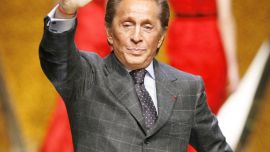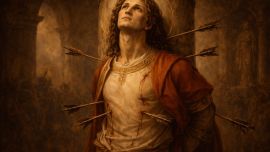There is a weird tension between Javier Milei and Mauricio Macri, despite an apparent professional friendship between the two.
The former president – once seen as the “slayer of populism” – has shared at least four private dinners with Argentina’s current anarcho-capitalist leader at the Quinta de Olivos presidential residence, dining on milanesas and ironing out the details of some sort of alliance between Macri’s PRO party and Milei’s libertarian horde.
While both of them emerged from outside the realm of mainstream politics, sharing the now-relished “outsider” moniker, Mauricio has always played the game, while Javier’s anti-caste mantra is generally accompanied by a distaste for traditional politics, leaving the nitty-gritty to Sister Karina and star political advisor, Santiago Caputo, and the rest of his minions. They are still feeling each other out, much like heavyweight boxers who dance around each other throwing light jabs for fear of being hit with an uppercut. All of which begs the question, who will stab the other one in the back first?
Milei clearly has the upper hand, which makes it even more puzzling why he decides to treat the ex-president with such courtesy, especially given he rarely grants it to other members of the political ecosystem.
In two years, the wild-haired economist went from talking head to head of state, effectively ousting the two hegemonic coalitions that had dominated the political scene over the last decade. Milei’s first victim was Juntos por el Cambio, the coalition founded by Macri that was torn apart by an acrimonious PASO primary campaign between Horacio Rodríguez Larreta and Patricia Bullrich. The ‘Civil War,’ in which Mauricio lent his support to Patricia and actively worked to dethrone Horacio, distracted them from an election they supposedly had in the bag. Not only was Rodríguez Larreta’s primary performance humiliating, but Bullrich didn’t even make it to the run-off. Milei went on to absorb Juntos por el Cambio’s electorate to crush Sergio Massa and the pan-Peronist front led by Cristina Fernández de Kirchner with Macri and Bullrich’s explicit support, sealed in the secret “Acasusso Pact,” just days after the first round of the presidential election.
At the time, Macri sought to offer “governability” by placing his team in key ministries and slots. Quick on her feet, Bullrich struck first and inked a deal with Milei behind Mauricio’s back, bringing in running-mate Luis Petri and snatching two ministries, Security and Defence, which had originally been promised to Vice-President Victoria Villaruel. Macri was hung out to dry, with no real power or cabinet seats in the Milei administration.
To make matters worse, Bullrich has since ramped up her attacks on the ex-president and the doves within the PRO party over which she then presided, insisting on a full-pm merger with La Libertad Avaza. She was quickly removed from her post by Macri, who took up the reins of the party and began to weave strategic alliances within the government, including Villarruel, the maverick vice-president, currently engaged in a proxy war with the Casa Rosada which pits her against sister Karina. Javier has become the “ham” in the sandwich, metaphorically (and satirically) stuck between the two. “Jamoncito,” Villaruel dubbed him.
Macri managed to tone down the feisty internal debate within PRO as to whether they had lost their identity or not. Their raison d’etre was once to oppose Kirchnerism, leading to a surprise victory together with the Unión Cívica Radical (UCR), while imposing an agenda of change based on structural reforms. The failure of their economic and political plan gave ex-president Cristina Fernández de Kirchner a new opportunity in 2019, which she skillfully took, picking Alberto Fernández and building an electoral coalition that brought her back to power.
Today, the question of what PRO represents still has to be resolved. What is the point of the party after Milei ate their lunch and became an even stronger proponent of anti-Kirchnerism and structural reform?
While some have sold their soul, like Bullrich, in Macri’s eyes there is a space for dissidence that should allow him to retain a significant portion of political power. After purging the party, he has selectively showed his opposition to the Milei administration, including in the recent congressional vote blocking the release of US$100 million in reserved funds for the newly minted SIDE spy agency run by Santiago Caputo, one of Macri’s enemies within the Milei administration.
The former president has singled the younger Caputo out as one of the rotten apples taking the president down the wrong path, to which Milei has responded by consistently showing his support for his political commissar, who remains a freelancer with no official post while amassing the most power out of anyone in the government except sister Karina.
Macri told his troupe to vote in favour of a new formula to calculate retirement and pension payments, much to the distaste of the Milei administration, which vowed to veto the measure as contrary to his budget surplus maxim. The former president’s calculated aboutface came in the form of a social media post, in which he agreed with Milei’s unpopular decision (who opposes raising pensions for retirees), using his legislators as cannon fodder in his strategic speculation with the government. They had also lent their support to UCR chair Martín Lousteau, one Milei’s favourite people to hate, allowing him to take the presidency of the Bicameral Intelligence Committee, together with Peronist and Kirchnerist support.
As Macri played his cards, so did the Casa Rosada. A recent report in La Nación indicated that the SIDE spy agency had sought to intervene in a series of cases for illicit espionage and other shenanigans during the former president’s administration, when the organism was still named AFI. In total, a supposed SIDE representative sought information on four cases involving Macri and his spy chefs, Gustavo Arribas and Silvia Majdalani. Caputo, who is quickly becoming Macri’s nemesis, controls the spy agency through Sergio Neiffert, the latest “Mr. 5,” and the Milei administration’s official communications strategy, including the so-called “troll army” which loves to target the former president. Macri, who knows all too well the power of using the spy agencies, wasn’t happy.
All of this occurs in a context in which PRO has informally become Milei’s legislative muscle. They must lend their support to achieve quorum and to vote the Executive branch’s bills into law. This becomes even more important in the context of the internal rifts within La Libertad Avanza, which is already seeing their limited caucus shrink in the face of expulsions and internal bickering. Not only is the Milei administration “offshoring” governability by using the PRO party’s votes to pass legislation, they are also eyeing next year’s midterm elections, where a full merger would allow them to earn a large number of legislators that respond to the will of the “Iron Triangle” – made up of the president, his sister, and Caputo.
That is exactly what Macri is trying to avoid. While he understands that Milei has absorbed a big chunk of their electorate, he believes the anarcho-capitalist owes him for having paved the way during his difficult four years in office. He remains popular with a core group of supporters and believes that by providing an onto to Milei, from a position of ideological affinity, he has a chance to get back into centre court, particularly if the economic situation doesn’t improve substantially in the near term.
Both of them are holding daggers behind their backs. Who will strike first?

























Comments